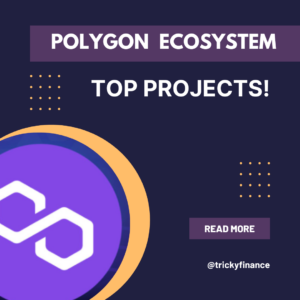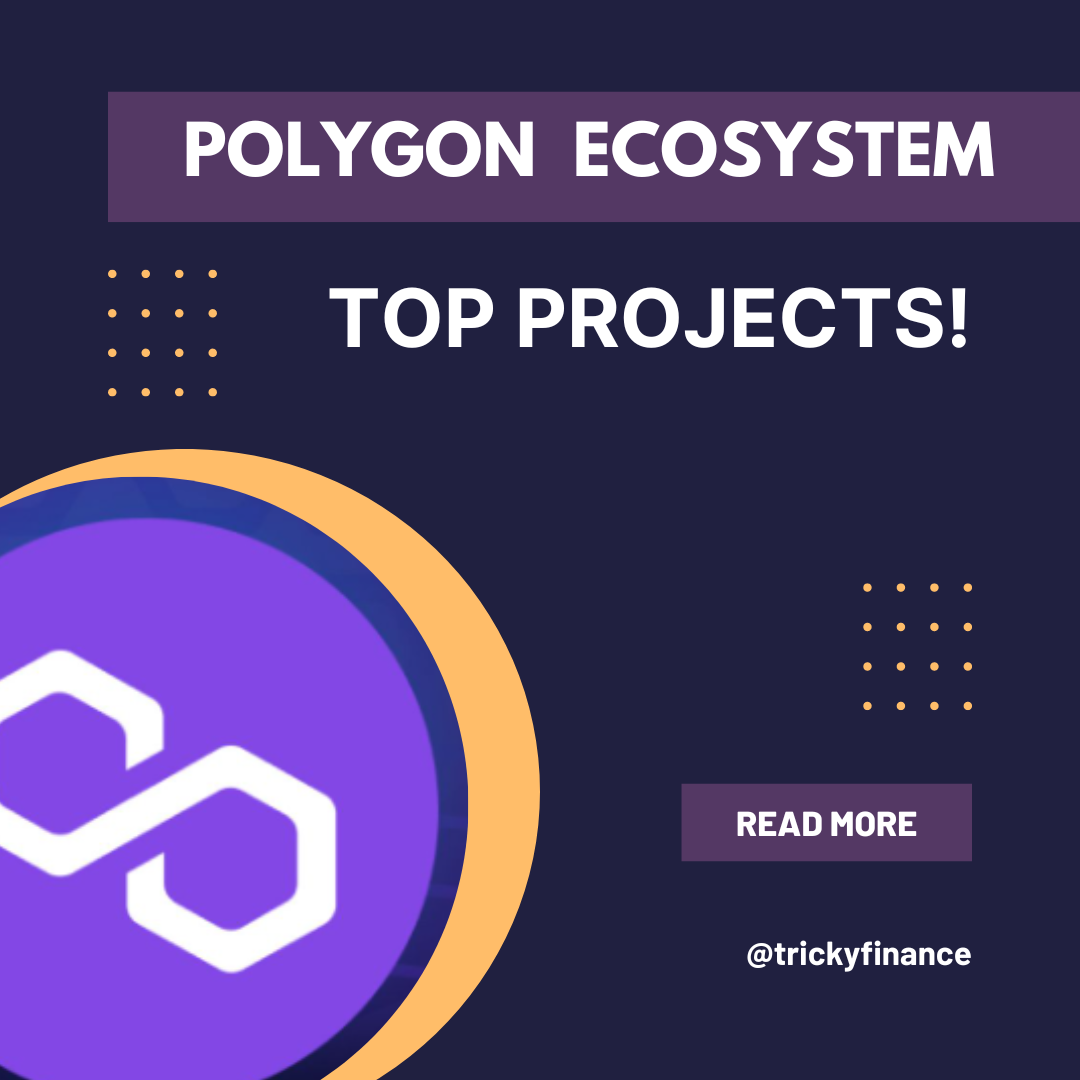Polygon, represented by MATIC, serves as both a cryptocurrency and a technology platform facilitating the interconnection and expansion of blockchain networks. Originating as Matic Network in 2017, Polygon operates within the Ethereum ecosystem, linking Ethereum-based projects.Despite Ethereum’s popularity, it grapples with sluggish transaction speeds and high costs. Polygon tackles these hurdles by executing transactions outside the Ethereum blockchain. Transactions are managed on a separate Ethereum-compatible blockchain before being reintegrated into the main Ethereum blockchain after processing. This approach notably alleviates the network congestion on Ethereum.
This article focuses on the various projects on the Polygon Ecosystem in order to help.

Thriving Ecosystem and Projects
Polygon supports a flourishing Ethereum scaling ecosystem, boasting Ethereum Virtual Machine (EVM) compatibility and ensuring swift transactions with minimal gas fees. Its ecosystem hosts a diverse array of projects, with over 28,000 contract creators, 219.11 million unique addresses, 2.44 billion transactions, and a staggering $12.80 billion in NFT sales volume.
Noteworthy projects on Polygon include Aave, Curve, Decentraland, UniSwap, SushiSwap, Aavegotchi, Skyweaver, and OpenSea. These ventures span decentralized finance, gaming, metaverses, and non-fungible token (NFT) marketplaces.
Top Polygon Projects for the year 2024
Let’s now take a closer look into the various projects available on the Polygon Ecosystem for a better understanding.
Top Polygon Wallets
Polygon wallets have established a specialized position for themselves. Serving as secure entry points to the Polygon network, a Layer 2 scaling solution enhancing Ethereum’s functionalities, these wallets play a crucial role in enabling rapid, cost-effective transactions. They cater to a diverse range of users, spanning experienced cryptocurrency enthusiasts to newcomers in the blockchain domain, providing an intuitive interface for managing assets and engaging with the Polygon ecosystem.
1. COCA Wallet
It developed in collaboration with Wirex, introduces the world’s pioneering Multi-Party Computation (MPC) wallet alongside a non-custodial debit card. By harnessing MPC technology, it eradicates conventional vulnerabilities linked with seed phrases and private keys, ensuring unmatched security. Additionally, it incorporates advanced AI-driven facial recognition for secure and convenient user authentication.
2. Zengo Wallet
Zengo Wallet stands as a self-custodial Polygon wallet, boasting an impeccable security track record with no hacking incidents and always ensuring recoverability. This achievement is attributed to three groundbreaking technologies: MPC cryptography and a 3-factor-authentication recovery model. Moreover, it offers round-the-clock in-app customer support and facilitates the purchasing, storage, and swapping of cryptocurrencies and NFTs.
3. Uphold Wallet
Uphold Wallet provides a user-friendly interface for purchasing, trading, and holding a wide array of assets, including over 250 cryptocurrencies, traditional currencies, and precious metals. Operating on a 100% reserve model, it prioritizes safeguarding user funds and maintains transparency through real-time asset and liability data, publicly accessible and updated every 30 seconds.
Top Polygon Games
Polygon games represent a burgeoning sector within the digital entertainment realm, blending interactive gameplay with blockchain technology. These games offer players a unique opportunity for true ownership of in-game assets, such as cards or characters, which they can securely trade on the marketplace. Additionally, some Polygon games incorporate progressive reward systems, heightening player engagement by providing exclusive rewards as they advance through the game.
1. Delysium
It stands as a massively multiplayer online role-playing game (MMO) embracing the play-to-earn concept. Backed by rct.AI x Deterrence and other AI partners, it immerses players in lifelike and captivating settings within virtual worlds. Players enjoy complete freedom to explore the metaverse and interact with their avatars, with the flexibility to switch between game modes based on their preferences or emotional state.
2. Affyn
It offers a distinct gaming experience by bridging the digital metaverse with the real world through innovative technologies. In-game events and activities seamlessly integrate with properties owned and developed by players, leveraging accurate geolocation data for an immersive experience.
3. Pegaxy
Pegaxy presents a play-to-earn Player vs. Player (PVP) horse racing game, where players compete against 14 other racers for the top three positions. Each race introduces randomized elemental factors such as wind, water, fire, speed, and more, adding unpredictability and excitement to every race.
Top Polygon NFTs
These distinct tokens, whether originating on the Polygon blockchain or transferred from another chain, have revolutionized our interaction with digital assets. Serving as a Layer 2 scaling solution for Ethereum, Polygon enhances transaction throughput and decreases fees, rendering it an optimal platform for minting, purchasing, and trading NFTs. The affordability and expediency of Polygon NFT transactions, compared to the Ethereum mainnet, present a more accessible and efficient option for creators and collectors alike.
Conclusion
Princy Agarwal, a postgraduate in English from Delhi University, writes content for Tricky Finance, where they simplify complex financial topics for readers. With a knack for clear communication, Princy’s work helps make finance understandable and accessible to all.




